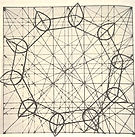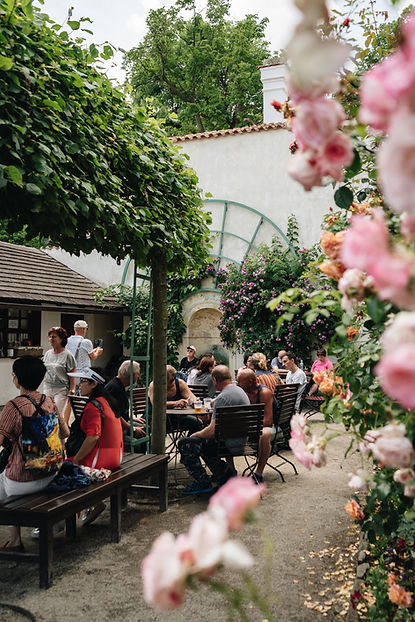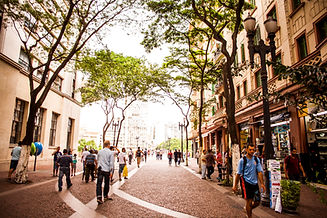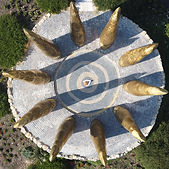
The Invitation

Café Now and Not Yet
The Café Now and Not Yet is both an offering and a call to action. On this page I provide tools for a unique, hard-to-categorize "workshop" designed to inspire reflection on creating a better country and thriving communities.
In the 1980s, while in Czechoslovakia, I met Palestinian students who passionately shared their dreams of liberation and self-determination. I asked them to think beyond their goals, questioning how their future country could address universal struggles like trust, corruption, and inequality. This conversation awakened my "moral imagination"—the ability to envision better realities.
Now, I invite you to gather with others, like in a café, to explore these ideas. Over three decades, I've found people from all backgrounds share similar hopes for fairness and flourishing communities. This exercise inspires participants to imagine a better world—and leaves the world better for it.
Or continue bellow to explore on the website
The Story So Far
“Why does goodness matter? What is it? Is it something we each make up, or is there a common standard true for everyone?” Trust is central to a thriving economy, deep friendships, and a rich social life. But we live in a time of growing social anxiety and loneliness. What is the basis of trust and trustworthiness?
Years ago, I sat in an old Viennese café, reflecting on these significant questions. I was working with people in Central Europe who had recently been liberated from oppressive totalitarian regimes. Many had experienced profound harm and trauma, which made trust difficult. They also found it difficult to imagine what genuine goodness could look like.
Then, one night, I had a strange dream: people were bringing their keys and locks into the City Square. Apparently, everyone had decided not to steal; keys and locks were no longer necessary. As the mountain of metal grew, I wondered at the environmental damage caused by the extraction and smelting of the steel. I was saddened by the waste of creative energy put into the design of the locking systems and wondered where it might more usefully have been put.
I woke up and wondered where I might find a source of goodness to ignite the moral imagination and lay a foundation for trust and trustworthiness. I still lock my door, but it is with sadness at the waste of human creativity.
These thoughts took time to grow, but that was fine. After all, in Viennese Cafés, they say you do not buy the coffee so much as rent the table. No one is going to pressure you to leave!
My friends and I have created hundreds of cafés where people sit, drink coffee, cake, wine, and cheese, and wonder together what life would be like if we could live up to our dreams of goodness. This is not some foolish utopia because we have learned that when you hope well, you begin to act. What follows is an offering and a call to action. I offer the tools you need to


The Decalogue
The Ten Words
The Decalogue is an ancient framework for moral principles that fosters trust, freedom, and community, often misunderstood as restrictive rather than liberating.
In my search for descriptions of goodness, I rediscovered some ancient wisdom, long forgotten and often misunderstood, that lays out a simple framework for trust and trustworthiness. A large group of people—recently freed from 400 years of enslavement—needed a set of moral principles to organise their lives together. They needed a framework that would set their expectations of each other and keep them free.
While meditating on this framework, a later king said, “Your law is a lamp unto my feet.” “I meditate day and night on them; they are like gold and honey.”
The dust of history has clouded our view. Our view of “commandments” is restrictive; our response is almost universally negative. Why would something liberating, glorious, and sweet become oppression and legalism? That's for those of a more cynical disposition to answer. I discovered its potential to liberate and inspire. That is how we use it in our Cafés.

The Purpose of the Event
The purpose of the Café is to ignite the moral imagination so people can visualise a world where goodness flourishes. By doing this, we can better find hope and build just, meaningful communities.
Too often, conversations about the good life stay conceptual or are overly simplistic. The Café helps people dig deeper, using their imaginations to explore what right living might look like in practical terms.


An Overview of the
Café Event
Setting Up the Café: "Now and Not Yet"
In a relaxed café-style setting, participants gather in small groups to discuss the effects of following one principle described in the Decalogue. A moderator guides the discussion, collects feedback from each group, and summarises the shared vision of a better society.
Viennese cafés are known for being places to relax and talk. We aim to recreate an environment where people feel comfortable lingering and engaging in meaningful conversation. The Café can be a standalone event or part of a larger gathering. It can also work during dessert at a formal dinner or as a casual group discussion. It can work over several evenings and be the basis for a meaningful book club.
Simple touches, like tablecloths, candles, and flowers, can transform even the dullest meeting space into something inviting. Changing the usual setup helps create a fresh atmosphere. These details make the event memorable and help participants envision a better world. Some groups even print menus listing the principle for discussion. The setting doesn’t need to be elaborate, but creativity adds to the sense of occasion.
The exercise helps us see the Decalogue as a description of freedom, not restriction. It provides a vision of living in harmony—with ourselves, others, and a higher purpose. By imagining the good, we can begin to hunger for it daily.

Why it matters


The Activity

Introduction (15 minutes)
The moderator welcomes participants and explains the purpose of the event. Begin with a thought-provoking question:
-
“What would society look like if everyone willingly followed the principles of the Decalogue without compulsion? Could these ancient guidelines hold the key to a freer, more trusting society?”
Explain the exercise: Each group will discuss one word (or commandment) and brainstorm its potential impact in the following three areas:
-
Economic: How might this affect money, resources, or systems?
-
Psychological: How would it change how people think and feel?
-
Sociological: How would it shape relationships and communities?
Group Discussions (45–60 minutes)
Each table explores their assigned Commandment with guided questions. A group member takes notes to share during feedback. Encourage participants to think practically and avoid cynicism.
Examples:
-
Do not steal: What would life be like if theft didn’t exist? Would we still need locks, passwords, or security systems?
-
Do not bear false witness: Imagine a world where honesty was universal. What would change in courts, businesses, or relationships?
Feedback (20 minutes)
Groups share their insights with other groups, focusing on the positive changes they envisioned. Encourage examples that show how these values could reshape everyday life.
Key takeaways often include:
-
The growth of trust as the foundation for relationships and communities.
-
A shift from managing “bad behavior” to pursuing meaningful work.
Reflection and Closing (20 minutes)
The moderator wraps up with a summary of the discussions. Highlight how these principles are not just rules but invitations to a better way of living.

Awakening the Moral Imagination
Seeing the Law through New Eyes
The Ten Words of the Decalogue aren’t just rules—they’re a map to a free, meaningful life and society. Instead of seeing them as restrictions, imagine them as a vision for how the world could be: full of trust, kindness, and purpose.
King David said, “I love your Law; it’s like gold and sweeter than honey.” What was he seeing that we often miss? Perhaps he understood that the Law isn’t meant to weigh us down but to inspire us toward a life of goodness and joy.
For Jesus, those old rules were a shadow that pointed to something richer. “Do not Murder” was the absolute minimum. He said, “You have heard it said, ‘Do not commit murder,’ but I say to you, if you call a man a fool, you have murdered him. But he also said, “I have come that you might have life abundantly”, and he did not mean that you have lots of heartbeats but that the quality of your relationships should be rich, deep and sustaining.
The Law as Freedom
The introduction to the Ten Commandments reminds us: “I am the Lord your God, who brought you out of slavery.” When God gave these commandments, it wasn’t to enslave but to liberate. These words invite us to imagine a world where trust and goodness are the norm—here freedom means much more than just doing what I want, but the freedom to live together in trust and respect without fear, lies, or harm.
Think of freedom like flying. If we try to fly without obeying the laws of aerodynamics, we crash. But when we embrace these laws—like in a plane—we can soar. These commandments are the same: they provide the structure for true freedom.
What If We Imagined Goodness?
Our imagination is a gift, but cynicism or selfishness often traps it. This exercise challenges us to imagine what life might be like if these ancient principles were embraced—not just by us but by entire communities.
When we imagine goodness, we awaken hope. And where hope lives, change begins.
Table Instructions

Each table will dive deeply into one word of the Decalogue, exploring its potential to reshape society, relationships, and individual lives. The discussions will focus on three practical areas of life:
-
Economic: How would this change financial systems, resources, or daily transactions?
-
Psychological: How might this impact how people think, feel, or see themselves?
-
Social: What changes would we see in trust, community, and how people interact?
This isn’t just about imagining a world without harm—it’s about picturing a world overflowing with goodness. Here’s how each Commandment invites us to think and dream:
These table instructions (one per table) can be used to frame the discussion.
The last six words are more practical for getting started.
Guidance for Moderators
-
Encourage imagination: Push participants to think beyond abstract ideas and visualize real, concrete changes.
-
Address cynicism: If someone says, “This will never happen,” remind them that this is about imagining what could be—not solving everything at once.
-
Prompt creativity: Use examples to spark ideas, like a world without passwords for “Do not steal” or courts for “Do not bear false witness.”


Table 1
Place your ultimate trust wisely
From the Decalogue: “Have no other gods before me.”
Focus: Be wise in who you trust.
Priorities of the Heart and Issues of power in society
-
Questions to Explore:
-
What “gods” do we serve today (e.g., wealth, success, technology)?
-
How and to what extent do these “gods” bring lasting satisfaction or security?
-
How does power work in our community/society?
-
Are you free to exercise dominion or does someone dominate you?
-
What might society look like if people placed ultimate trust in someone greater than us all, who doesn’t exploit or exhaust us?
-
If you could change one thing in this area, what would it be?
-
-
Imagine: A world where people’s priorities shift from chasing wealth or status to building meaningful lives rooted in trust, purpose, and community.

Table 2
Don’t let false ideals control you
From the Decalogue: “Do not make false images to bow down to them.”
Focus: Our human capacity for Imagination
-
Questions to Explore:
-
What would life look like if imagination was used to create beauty, solutions, and connection instead of distortions and obsessions?
-
What might change in advertising if the images we use were faithful to reality?
-
-
How does an undisciplined imagination harm relationships and decision-making?
Imagine: A city where art, innovation, and relationships reflect truth and goodness rather than fear or envy.

Table 3
Speak with intention and respect
From the Decalogue: “Do not take the Name in Vain?.”
Focus: Integrity in Language
Questions to Explore:
-
-
Where do you experience the economic impact of empty words.
-
What does it mean to speak with intention?
-
How can misusing words erode trust?
-
How might society change if every word carried weight and truth?
-
Imagine: A world where people mean what they say, and say what they meanand their words heal instead of harm. How would relationships deepen, and trust would grow?


Table 4
Honor rest and renewal
From the Decalogue:“Remember the Sabbath.”
Focus: Time, Rest and Work.
-
Questions to Explore:
-
What is your relationship to time?
-
How does constant busyness impact mental health, families, and communities?
-
To what deeper kind of rest might this Commandment point?
-
How might society change if people honored the rhythms of work and rest?
-
Imagine: A world where rest is not a luxury but a shared practice that restores relationships, creativity, and purpose.

Table 5
Respect those who shaped your life
From the Decalogue: “Honor your father and mother.”
Focus: Respect and reconciliation.
-
Questions to Explore:
-
How do strong family relationships ripple out into communities for good and ill?
-
What does it mean to honor parents (or primary caregivers) even when they fall short?
-
Our parents (or primary caregivers) are the gateway to our history and how we learn our culture, value system and train our basic instincts. They describe who is “in” and who is “out.”
-
How might forgiveness and understanding heal generational divides?
-
Imagine: A society where families grow stronger, not because they’re perfect, but because they nurture respect, accountability, and reconciliation.

Table 6
Choose life in every form
From the Decalogue: “Do not murder.”
Focus: Life and dignity.
-
Questions to Explore:
-
How does harm begin with anger, gossip, or exclusion?
-
What would it look like to actively protect and uplift life—emotionally, relationally, and physically?
-
How might communities flourish if human dignity was a core value?
-
Imagine: A world where conflict is resolved peacefully, relationships are healed, and life is honored in every form.

Table 7
Be faithful to your commitments
From the Decalogue: “Do not commit adultery.”
Focus: Trust and faithfulness.
-
Questions to Explore:
-
How does trust—or the lack of it—affect relationships and families?
-
What would change if people were deeply faithful in their commitments?
-
How might children and communities thrive in a culture of stability and trust?
-
Imagine: A world where relationships are safe havens of love and loyalty, providing a foundation for future generations.

Table 8
Live honestly and generously
From the Decalogue: “Do not steal.”
Focus: Honesty and generosity.
-
Questions to Explore:
-
What forms of theft exist beyond taking possessions (e.g., time, credit, ideas)?
-
How would life change if people no longer needed to protect their resources?
-
What new opportunities might emerge in a culture of fairness and generosity?
-
Imagine: A society where locks, passwords, and security systems are unnecessary, freeing time and energy for connection and creativity.

Table 9
Value truth in all things
From the Decalogue: “Do not bear false witness.”
Focus: Truth and trust.
-
Questions to Explore:
-
How does dishonesty erode trust in relationships and institutions?
-
What would happen if truth-telling became the norm in every aspect of life?
-
How might honesty transform politics, business, and personal interactions?
-
Imagine: A world where people trust each other without question, knowing words match reality.
Table 10


Celebrate what you have and others’ success
From the Decalogue: “Do not covet.”
Focus: Contentment and generosity.
-
Questions to Explore:
-
How is coveting different from healthy ambition or desire?
-
What are the hidden costs of jealousy (e.g., stress, conflict)?
-
How might society change if people celebrated others’ success instead of resenting it?
-
Imagine: A culture where generosity and gratitude replace envy, freeing people to enjoy what they have and share with others.

Summary Reflections
For a rich understanding of the implications of the Decalogue, and as preparation for the exercise, read or listen to “Rumours of a Better Country” by Marsh Moyle. Each chapter unfolds the possibilities of trust in a time of Moral outrage. Feel free to use the ideas in the book if you find them useful.
The Commandments: A Vision for Goodness
The Ten Commandments are not just a list of rules but a blueprint for a life of trust, joy, and freedom. They show us what life looks like when lived in harmony—with ourselves, each other, and the world. By imagining a world where these principles are fully embraced, we gain a clearer vision of the good life and how to move toward it.
1. The Commandments as a Description of Freedom
The Commandments begin with this declaration: “I am the Lord your God, who brought you out of slavery.” They are not chains but keys, unlocking a life free from fear, dishonesty, and harm.
True freedom isn’t doing whatever we want; it’s living in a way that nurtures relationships and builds trust. Imagine a society where people live generously, honor one another and seek the good of their neighbors. That’s the freedom the Commandments describe—a life of flourishing, not just for individuals but for entire communities.
Example: Freedom thrives in trust. Without trust, we live in fear—locking doors, hiding resources, and guarding our words. But when trust grows, so do creativity, generosity, and peace.
2. The Power of Imagination
Imagining goodness is the first step toward living it. When we visualize a world where honesty, kindness, and rest are the norm, we awaken a hunger for what is possible.
The exercise of imagining the impact of the Commandments isn’t just theoretical—it’s transformative. By picturing a world free from deceit, theft, and envy, we begin to see the practical steps to align our lives with those values.
Example: Imagine how much energy we could save if trust could replace bureaucracy. There is no need for passwords, notaries, or locks. This isn’t just a dream—it’s a glimpse of the world we can strive toward.
3. The Web of Connections Across the Commandments
The Commandments form a web of trust and goodness; they are not isolated. Each reinforces all others:
-
“Do not steal” depends on truthfulness (“Do not bear false witness”).
-
“Do not covet” is the antidote to envy, which drives dishonesty and theft.
-
“Honor your parents” builds respect, which strengthens communities and families.
This interconnectedness reminds us that goodness is not about isolated acts but about living with integrity in all areas of life.
4. The Commandments as a Picture of the Kingdom
In the Lord’s Prayer, we ask, “Your kingdom come, your will be done on earth as it is in heaven.” The Commandments give us a glimpse of that kingdom—a world where relationships are whole, trust is abundant, and goodness thrives.
This isn’t just about what happens in the future; it’s about how we live now. Every decision we make, every act of kindness, every step toward justice brings a piece of that kingdom to life.
Example: Jesus summarized the Commandments as loving God and loving your neighbor. This love is active—it looks like generosity instead of greed, truth instead of lies, and healing instead of harm.
5. Why the Law Still Matters
The Commandments don’t have the power to make us good—but they show us what goodness looks like. They set a standard that inspires us to grow, not in our own strength, but by seeking help from one another and, for believers, from God’s Spirit.
By showing us the kind of world we long for, the Commandments point us toward the daily choices that make that vision real. They don’t just reveal what’s wrong; they reveal what’s possible.
6. The Bigger Picture: Building a Better Country
This exercise shows that goodness isn’t just a lofty ideal—it’s a practical, concrete goal. When we imagine a world shaped by these principles, we start to see the small ways we can live them out right now.
-
“Do not steal” becomes an invitation to live generously.
-
“Do not bear false witness” invites us to speak truthfully, even when it’s hard.
-
“Honor your parents” reminds us to value history, family, and reconciliation.
Each step matters. Every act of kindness, honesty, and respect makes the world more like the one we imagined.
Key Takeaways from the Café Experience
-
Hope is contagious: Imagining goodness inspires us to believe change is possible.
-
Change starts small: Grand visions are built on daily acts of trust and integrity.
-
We’re all connected: How we live impacts everyone around us, for better or worse.
Closing Reflection: The Commandments challenge us to dream boldly. They show us that goodness is not out of reach—it’s waiting to be imagined, chosen, and lived.